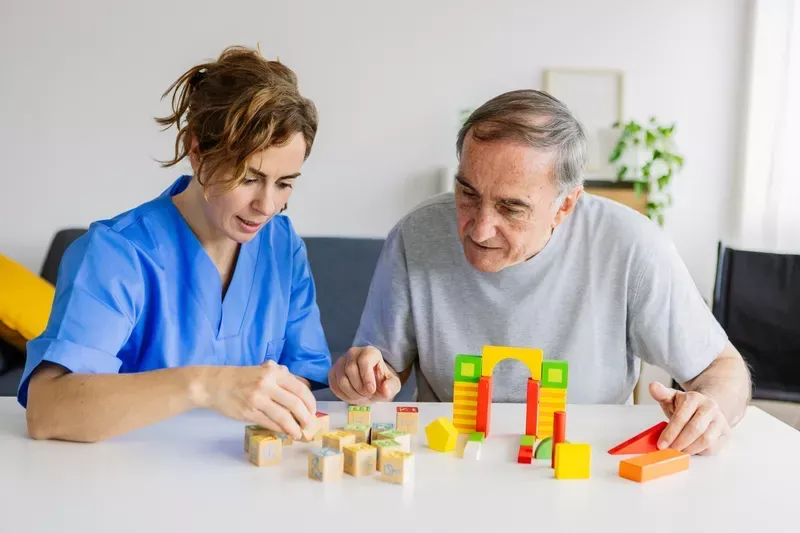BLOG
How to Recognize and Manage Agitation in Dementia Patients
Caring for dementia patients involves navigating complex behavioral challenges, including episodes of agitation. Agitation can manifest as restlessness, verbal outbursts, or physical behaviors that disrupt daily routines. Understanding the root causes of agitation and developing effective strategies is vital for caregivers and patients. A compassionate and informed approach can significantly improve the quality of life for those living with dementia.
Agitation often signals unmet needs or environmental discomfort in dementia patients. By identifying the triggers, caregivers can intervene to de-escalate situations before they intensify. Let’s explore how to recognize, prevent, and manage agitation in dementia patients through evidence-based strategies.
Identifying Early Signs of Agitation in Dementia Patients
Recognizing the early signs of agitation allows caregivers to act quickly and prevent escalation. Restlessness is a common indicator, where patients may fidget, pace, or be unable to remain calm. These behaviors often stem from discomfort or confusion and require immediate attention. Observing changes in movement and energy levels can provide valuable clues.
Verbal signs of agitation include repetitive speech, shouting, or increased frustration. Patients may vocalize their discomfort in irrational ways but reflect genuine distress. Listening carefully to these cues can help caregivers address underlying issues promptly. Effective communication at this stage can prevent agitation from worsening.

Nonverbal cues also play a crucial role in identifying agitation. Tense body language, clenched fists, or rapid breathing can signal emotional or physical discomfort. Caregivers who learn to read these signals can intervene with appropriate calming techniques. Proactive monitoring of both verbal and nonverbal cues is essential for dementia care.
Recognizing patterns in agitation can aid in prevention. Keeping a journal of behaviors and triggers helps caregivers anticipate and mitigate future episodes. This proactive approach fosters a safer, more supportive environment for dementia patients.
Common Triggers of Agitation in Dementia Patients
Agitation in dementia patients often arises from specific triggers. These triggers can be categorized into physical discomfort, environmental stressors, and emotional factors. Understanding and mitigating these triggers can significantly reduce the frequency of agitation. Caregivers must remain vigilant and adaptable to patients' changing needs.
Physical discomfort, such as pain, hunger, or fatigue, is a leading cause of agitation. Many dementia patients struggle to articulate their needs, making it essential for caregivers to assess these factors regularly. Ensuring patients are well-rested, nourished, and comfortable can prevent many episodes of restlessness. Proactive caregiving minimizes unnecessary distress.
Environmental factors, including noise, clutter, or overstimulation, can overwhelm dementia patients. An overly noisy or chaotic space may heighten confusion and agitation. Creating a calm, organized environment with minimal distractions promotes a sense of security. Adjustments to lighting, sound levels, and spatial organization can make a significant difference.
Emotional triggers, such as loneliness, fear, or frustration, also contribute to agitation. Patients may feel isolated or confused by unfamiliar settings or interactions. Consistent routines, familiar objects, and meaningful social connections can ease these emotional burdens. Caregivers must remain empathetic to patients' psychological needs.
Techniques for Managing Agitation
When agitation occurs, caregivers need effective strategies to manage the situation. Interventions should aim to soothe the patient and address the root cause of their distress. Using a calm and empathetic approach is crucial for de-escalation. Practical techniques can restore balance and promote a sense of well-being.
Redirection is one of the most effective ways to manage agitation. Guiding patients toward a calming activity, such as listening to music or engaging in a familiar task, can shift their focus. This approach helps alleviate feelings of restlessness or frustration. Engaging the senses through touch, sight, or sound often has a positive impact.

Validation therapy is another valuable tool for managing agitation. Acknowledging patients' emotions without correcting or dismissing them helps build trust and reduce stress. Simple statements like, "I understand you're upset," can foster connection and provide reassurance. This method validates their feelings while gently guiding them toward calmness.
Physical relaxation techniques, such as gentle hand massages or breathing exercises, can be beneficial. These methods help patients release tension and promote physical and emotional relaxation. Caregivers should ensure these techniques align with the patient’s comfort level. A tailored approach ensures maximum effectiveness.
Creating a Calming Environment
The environment plays a significant role in reducing agitation among dementia patients. A well-designed space can provide comfort and minimize triggers. Simple adjustments to the living environment can have profound effects on patient behavior. Prioritizing calmness and familiarity is key to effective dementia care.
Lighting can significantly influence mood and behavior. Harsh, artificial lighting may confuse or irritate patients, while natural, soft lighting fosters relaxation. Adjustable light sources to mimic natural day-night cycles help regulate patients’ circadian rhythms. Proper lighting creates a more soothing atmosphere.
Noise levels should also be carefully managed. Loud or unpredictable sounds can overstimulate dementia patients, leading to heightened agitation. Reducing background noise and introducing calming sounds like nature tracks or soft music creates a more peaceful setting. This sensory adjustment often reduces confusion and restlessness.
Familiar items and personal belongings provide comfort and stability. Displaying cherished photos, keepsakes, or favorite blankets can evoke positive memories and emotions. Incorporating these items into daily routines reinforces a sense of security. Familiarity helps patients feel more connected to their environment.
Consistency in the layout and organization of a living space is equally important. Predictable surroundings reduce anxiety and help patients navigate their environment more confidently. A tidy, clutter-free space prevents unnecessary stress and fosters a sense of control.
Supporting Caregivers in Managing Agitation
Caring for dementia patients can be physically and emotionally demanding. Providing support for caregivers is essential to effective dementia care. Resources, training, and self-care strategies empower caregivers to manage agitation more effectively. A collaborative approach ensures better outcomes for both patients and caregivers.
Training programs equip caregivers with the tools needed to handle challenging behaviors. Workshops on dementia-specific strategies, such as validation therapy or redirection techniques, provide valuable insights. Continuous learning ensures caregivers stay updated on best practices. Knowledge is a powerful resource in dementia care.
Emotional support for caregivers is equally important. Access to counseling or support groups allows caregivers to share experiences and receive encouragement. Connecting with others who understand the unique challenges of dementia care reduces feelings of isolation. A strong support network builds resilience.
Respite care offers caregivers much-needed breaks from their demanding responsibilities. Temporary care services allow them to recharge physically and emotionally, ensuring they can return to their caregiving role with renewed energy and focus. Respite care is a vital component of sustainable caregiving.
Caregivers must also prioritize self-care to maintain their well-being. Regular exercise, a balanced diet, and sufficient rest are critical for their mental and physical health. By taking care of themselves, caregivers can provide better support for their loved ones.
Partnering with Dementia Care Experts
Managing agitation in dementia patients requires empathy, patience, and expertise. Caregivers who understand triggers and implement effective strategies can create a more supportive and calming environment. Early intervention, environmental adjustments, and ongoing caregiver support are key to successful dementia care.
At Assured Senior Living, specialized dementia care focuses on creating a safe, nurturing environment tailored to each patient’s needs. Their compassionate team provides personalized support, helping families navigate the complexities of dementia care.
With resources, training, and expert guidance, Assured Senior Living ensures patients and caregivers receive assistance. Reach out today to learn how their services can improve the quality of life for your loved one.















